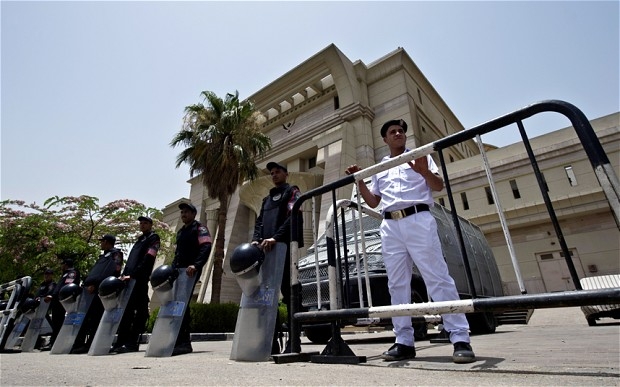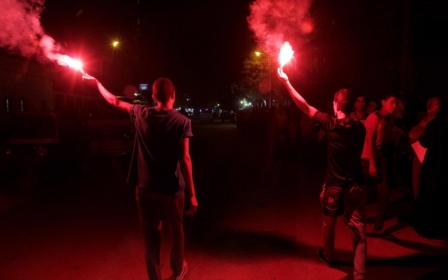Minister: Egypt has 'no political prisoners'

Egypt’s Justice Minister told an EU humanitarian envoy that Egypt "has no political prisoners," insisting that all those now in detention are facing criminal charges, according to a Tuesday statement.
"Prisons in Egypt are under the supervision of the general prosecution and judiciary," Mahfouz Saber told Stavros Lambrinidis, the EU's special representative for human rights, according to a statement issued by Egypt's Justice Ministry in the wake of the meeting.
Lambrinidis' visit to Egypt comes two weeks ahead of an international human rights review to be carried out by the EU in Geneva.
The meeting between the two officials also tackled a raft of recent death sentences handed down earlier this year against a total of more than a thousand supporters of Egypt's Muslim Brotherhood.
During Tuesday’s meeting, the ministry said, Saber objected to Lambrinidis' suggestion that Egypt should reduce the maximum remand period at its prisons.
Under Egyptian law, suspects can be detained prior to trial for up to two years.
"This is an internal issue to be reviewed only by state institutions – no foreign entity has the right to interfere with it," the ministry said.
Saber went on to note that over 600 detainees who had not been charged were recently released following "periodical reviews" by prosecution authorities.
In response to Saber’s comments, Ahmed Helmi, an Egyptian rights lawyer and member of the Freedoms Council of the Lawyers’ Syndicate, accused the authorities in Egypt of arbitrarily applying remand laws.
Speaking to Anadolu Agency, Helmi contended that the law was generally used "to carry out politically-motivated detentions."
He asserted that more than 20,000 people are currently languishing in Egyptian prisons pending politically-motivated trials.
"The Egyptian judiciary is far from being independent; it is deeply involved in the country's political crisis," Helmi stated.
There is no official estimate for the number of people detained in Egypt since last year's ouster of Mohamed Morsi – Egypt's first freely elected president – by the army.
However, the Egyptian Centre for Economic and Social Rights, a local NGO, recently documented over 21,000 cases of people who had been subject to prosecution since Morsi's ouster.
The authorities accuse Morsi's supporters and Muslim Brotherhood members of sponsoring violence, while the Brotherhood accuses Egypt's army-backed authorities of killing and jailing political opponents.
Al Jazeera journalists’ appeal to be heard in January
As the Justice Minister’s comments were made public, it was revealed that an Egyptian court will rule on an appeal by three foreign Al Jazeera journalists on 1 January.
The journalists, from the Doha-based television channel, are appealing against jail terms delivered against them this summer, an Egyptian judicial source has told Anadolu Agency.
The three reporters, including Australian journalist Peter Greste, were slapped with jail terms ranging from seven to ten years for "fabricating news."
The privately-funded satellite channel has launched a high-profile campaign demanding the release of its workers.
President Abdel Fattah al-Sisi’s government has accused Al-Jazeera of harbouring bias in favour of ousted president Mohamed Morsi and his embattled Muslim Brotherhood group, an allegation the network denies.
Al Jazeera is run from Qatar, the Gulf State that until mid-September played host to a number of exiled Muslim Brotherhood leaders, and is frequently accused of supporting the organisation.
Al Jazeera’s Egyptian outlet, Al-Jazeera Mubasher, was ordered to stop broadcasting on 4 September, after a court accused the channel of attempting to “tarnish the image of the great Egyptian army.”
Stay informed with MEE's newsletters
Sign up to get the latest alerts, insights and analysis, starting with Turkey Unpacked
Middle East Eye delivers independent and unrivalled coverage and analysis of the Middle East, North Africa and beyond. To learn more about republishing this content and the associated fees, please fill out this form. More about MEE can be found here.




